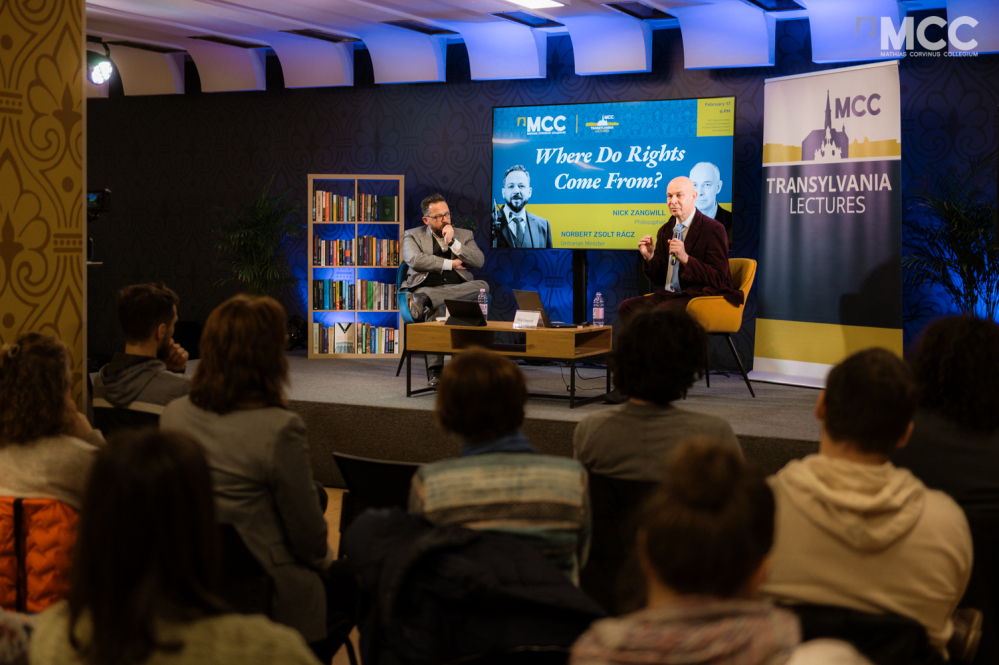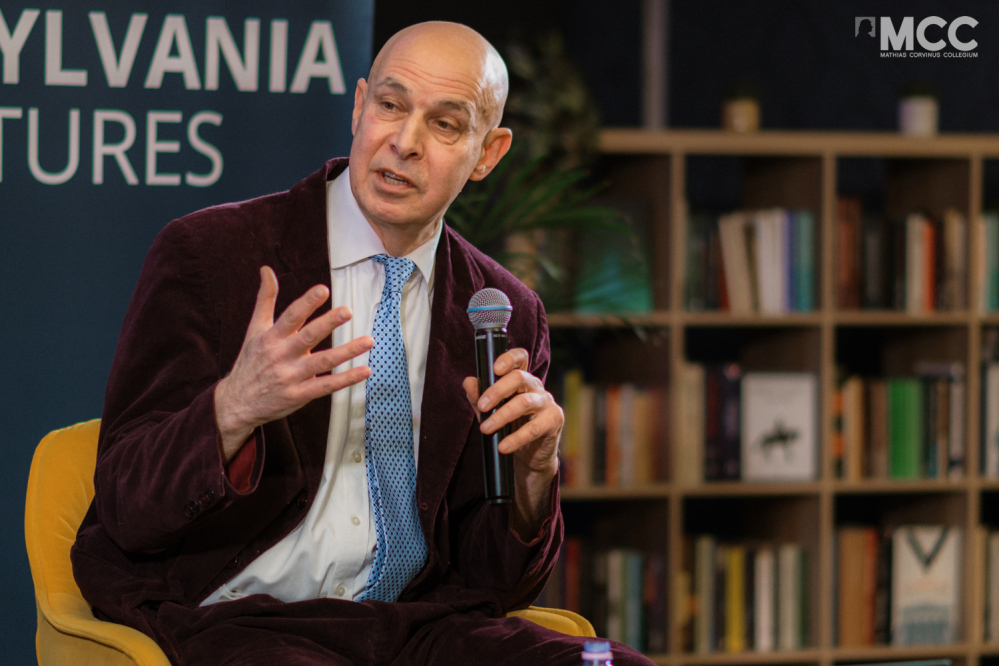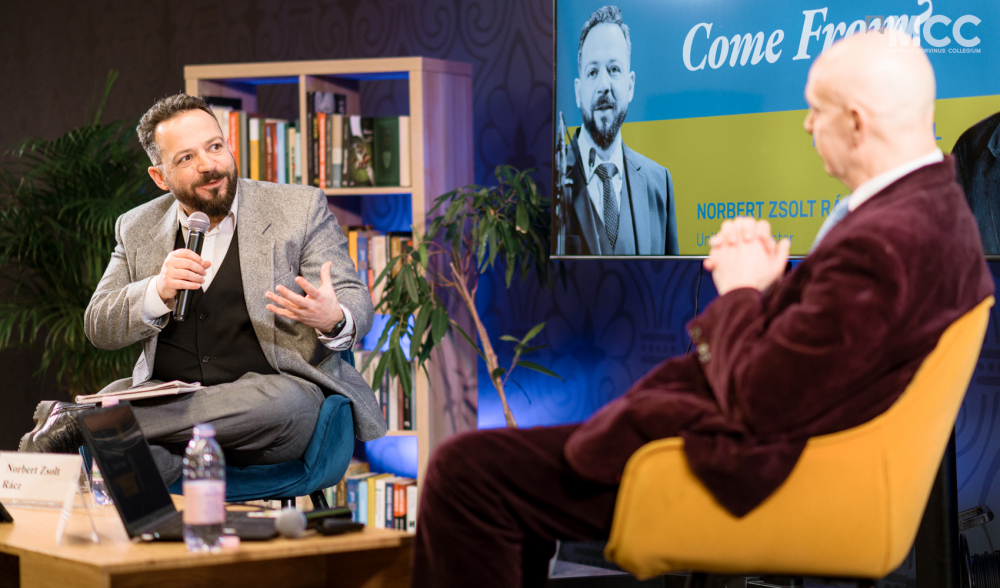Reading time: 4 minutes
The latest edition of the Transylvania Lectures series in Kolozsvár/Cluj-Napoca brought forth a stimulating debate on one of philosophy’s pressing questions: Where do rights come from? Featuring philosopher Dr. Nick Zangwill and Reverend Norbert Zsolt Rácz, the discussion examined the competing roles of consciousness and rationality in generating moral rights on February 17, 2025.
The conversation revolved around two primary candidates for grounding rights: consciousness (the ability to experience the world) and rationality (the capacity for reason and thought). While many argue that mere sentience is enough to warrant moral consideration and rights, Dr. Zangwill made a strong case that rationality, rather than consciousness, is the defining criterion for rights.
According to Zangwill, rational beings possess a level of autonomy and self-governance that sets them apart, making it inherently wrong to treat them merely as means to an end. He argued that rationality establishes moral side-constraints, meaning that even for a greater good, a rational being cannot be sacrificed. This, he contrasted with consciousness, which, though morally significant, does not itself generate rights. He illustrated this through the controversial idea that while one may justify sacrificing a conscious animal for a greater benefit, the same reasoning cannot apply to rational beings.
Zangwill stated: "Rights come from our nature as rational beings. If you have the capacity to reason, to self-reflect, and to govern yourself, you cannot be used as a mere tool for someone else’s ends."
A key theme in Zangwill’s argument was the connection between rationality and rights. He proposed that rights arise from the nature of rational beings as self-determining entities—any interference with their agency is a direct violation of their essence. Conscious beings, by contrast, lack this self-governing capacity, making them subject to different moral considerations, such as the maximization of well-being rather than the protection of individual rights.
As he emphasized, "The ability to determine one’s own fate is fundamental. When you interfere with a rational being’s decisions, you are violating what makes them who they are."
The Moral Status of Non-Rational Humans
One of the most challenging aspects of this theory concerns infants and individuals with severe cognitive impairments. If rights stem from rationality, how do we justify granting rights to those who do not fully exercise rational thought? Zangwill’s response: Such individuals stand in a special relation to typically rational beings. Infants, for example, are in a developmental phase leading to rationality, while cognitively impaired adults belong to the broader category of rational beings by virtue of their species and potential.
Zangwill acknowledged the complexity of this issue: "Even if someone does not actively engage in reasoning, they are part of the broader rational community. Infants are ‘booting up’ into rationality, and severely disabled adults retain a connection to our shared nature."
Interference, Autonomy, and Ethical Dilemmas
The discussion also delved into real-world applications of this philosophical distinction. A compelling thought experiment involved an isolated indigenous tribe facing an impending natural disaster. Suppose they refuse to evacuate due to spiritual beliefs. Would it be morally justified to forcibly relocate them? If rational beings have the right to self-determination, should they be allowed to make a decision that leads to their demise?
Zangwill acknowledged the weight of rights but suggested that in extreme cases, overriding autonomy for the greater good might be morally permissible. However, this violation would still constitute a moral wrongdoing, even if ultimately justified—a critical nuance in weighing rights against broader ethical concerns.
He noted, "The whole point of rights is that they cannot simply be overridden for someone’s own good. But there are moments when the stakes are so high that we may be forced to intervene—though we should recognize it as a moral failure, not a triumph."
AI, Rationality, and Future Rights
The conversation took a futuristic turn with an exploration of artificial intelligence. If an AI system were to exhibit self-reflective reasoning, would it be entitled to rights? Zangwill affirmed that any entity capable of rational autonomy would inherently possess rights, regardless of its biological status. However, he dismissed the idea that superior intelligence would grant an entity greater rights or moral authority over human beings. "If an AI is truly rational, then it has rights, just like us. But intelligence alone does not confer moral superiority," he argued.
In conclusion, Dr. Zangwill’s lecture provided a compelling hierarchy of moral considerations. While the debate remains open, the event challenged fundamental assumptions about the nature of morality, autonomy, and what it means to be a rights-bearing entity. The discussion continues beyond Transylvania Lectures, leaving participants with thought-provoking questions about the essence of human dignity and ethical responsibility in an ever-evolving world.
As part of the Transylvania Lectures series, Dr. Zanwill also held a lecture in Marosvásárhely/Târgu Mureș about the philosophical and scientific challenges of understanding the nature of consciousness.






